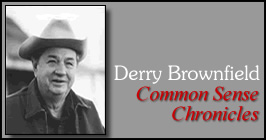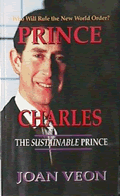“COMPETITION” WAS ONCE KING
By
Derry Brownfield
May 30, 2010
NewsWithViews.com
For nearly a century the slogan used by the Kansas City Stockyards was: “SHIP TO KANSAS CITY WHERE COMPETITION IS KING.” The stockyards no longer exist and competition also has gone by the wayside. The Brazilian beef packer, JBS, purchased Swift & Company and has now purchased Pilgrims Pride Poultry Establishment, making it the largest beef packer in the world which is also involved in poultry and pork sales. When I was in college in 1950, I was told by my economics professor that farmers must get bigger and more efficient or get out of farming. Today only 4 beef packers, Tyson, Cargill, JBS Swift and National Beef, control 85% of the fed cattle market. Smithfield Foods, Tyson, Perdue and Sanderson Farms control 60% of the broiler chicken market. Practically all of our nation’s food comes from only a few large, multinational corporations. Kraft is planning to purchase Britain’s Cadbury to create a food company with worldwide sales of $55 billion, yet Nestle is almost twice as large as Kraft and operates globally.
Sixty years ago I was taught that bigger was always better and as farmers became more efficient we would produce for less and consumers would benefit by purchasing cheaper food. This hasn’t been true in agriculture and it certainly isn’t true for the oil industry which has grown beyond all expectations. Royal Dutch Shell is the world’s biggest economy, bigger than the economy of Norway. Pennzoil’s acquisition of Quaker State led to more expensive motor oil. When Procter & Gamble purchased Tambrands, tampons became more expensive. When General Mills purchased Chex brands, cereal became more expensive.
The multinationals control the price of the items they sell at the retail level and they also control the price they pay for the raw product. The average price of beef at the retail level is over $4 a pound, yet the entire beef cattle industry is on the verge of collapse. We have fewer cattle in the United States now than we had in 1950; at the same time cattle feeders are losing from $100 to as much as $300 for each animal sold and the cow/calf producers are going out of business on a regular basis.
Market concentration and loss of competition has been occurring over the past 50 years. Poultry was the first animal industry to be taken over by the giant agribusiness corporations. Then the hog industry went into corporate control. The entire food industry has been hijacked and is now controlled by a few multinational corporations on a global basis. Fred Stokes writes in the January 2010 edition of OCM’s news letter: “It appears that our government will finally act to confront the dysfunctional markets that have so devastated American agriculture. Assistant Attorney General Christine Varney, who heads the Antitrust Division of the Department of Justice, served notice that she intended to enforce the antitrust laws, especially those affecting agriculture.”
If she is successful, she will have accomplished something that hasn’t been done in over a half century. Fifty-years ago big agribusiness began hiring individuals away from the USDA, the Department of Justice, and many other government agencies. They were also successful in getting these job openings filled with their own employees. By making large campaign donations and having inside influence among the government agencies, these mega-corporations have been successful in making their own rules, setting their own priorities and taking over the nation’s agricultural production.
If the Obama administration is serious about enforcing the antitrust laws that have been on the books for over 100 years, it will be the first administration since Theodore Roosevelt became President in 1901. Theodore (Teddy) Roosevelt was known as the “Trust Buster” as he hated the large business monopolies. He was opposed to concentration of power and filed suit against 44 major corporations, breaking up John D. Rockefeller’s oil trust and James Duke’s tobacco trust. Since that time America’s corporations have learned how to control the government, rather than have the government control them.
| Subscribe to the NewsWithViews Daily News Alerts! |
The Obama Administration may be talking a good show, but I’m afraid when the noose begins to tighten around the horns of big business, Obama will be forced to cut his rope and run.
� 2010 Derry Brownfield - All Rights Reserved











